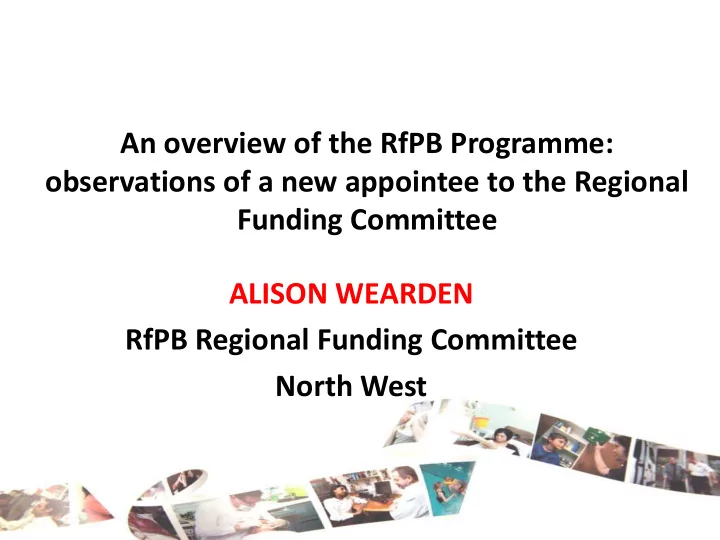

An overview of the RfPB Programme: observations of a new appointee to the Regional Funding Committee ALISON WEARDEN RfPB Regional Funding Committee North West
• Very brief overview of purpose of RfPB • The procedure for judging applications • My experiences on the funding committee – what we do and how we do it
The RfPB Programme • Response-mode funding programme • National budget about £25 million per year; regional budgets proportional to population • Grants may be: - Up to 36 months in duration - Up to £250k • Three funding competitions per year • Ten Regional Funding Committees
Aim of programme is to support projects in health services and public health research, e.g. those that.... ...study the way NHS services are provided and used ...evaluate whether interventions are effective and provide value for money ...examine whether alternative means for providing healthcare would be more effective ...formally assess innovations and developments in healthcare ...pilot or assess feasibility of projects requiring major applications to other funders
The Programme will not fund • Laboratory-based research or basic science • Setting up or maintaining research units • Proposals which are solely service developments • Proposals which are solely audits, surveys, needs assessment, technology developments
Selection Criteria and Eligibility • Applications judged on: – the quality of the research proposed – the significance and potential benefit of the research to the NHS • All researchers in the NHS in England can apply • For joint NHS/university applications, funding is awarded to the NHS partner
The Application Process • Applications made via website • Full application received by deadline • Preliminary scrutiny and administrative sift • External peer and lay review • Full committee assessment • Final ratification • Notification of outcome • http://www.ccf.nihr.ac.uk/RfPB/Pages/home.aspx/
The Preliminary Scrutiny Stage Four potential questions will be asked: 1. Is the proposal in scope? 2. Is there potential for patient benefit? 3. Are the details of the proposal within the rules of the Programme? 4. Is the design (on the face of it) sound and appropriate?
Is the proposal in scope? • Applied research - not basic knowledge generation • Findings capable of improving how the NHS works for the health and wellbeing of patients. • In case of a pilot study a clear trajectory into the definitive study. • Not solely developing or testing measurement tools or new kind of analysis or methodology • Applications that emerge from the interaction with patients and public are explicitly welcomed.
Is there a convincing patient benefit? • When will benefit occur? • Evidence of benefit in stated outcomes • Direct involvement in local practice not just national policy • Dissemination- won’t solely enhance research portfolio but lead to NHS improvement as well • Resources- any resources needed for acting on the findings?
Are the research design and the methods well enough described to allow peer review? Are there obvious faults in the research • design? • Is it absolutely clear what will be done?
Have the administrative rules been met? • >250K – automatic rejection • >3 years – automatic rejection • No declaration and signatures – automatic rejection • No NHS involvement – automatic rejection
Peer review process • At least three peer reviewers are sought – often up to six • Researcher in same/similar field • Practitioner in same/similar field • Public/patient
Regional funding committee • About 20 people round table (names on RfPB website)* • Meeting will be told how much money is available, how many applications can be funded, whether to have a “reserve list” • Meeting lasts about 5 hours • Papers sent out one month in advance • Considers 8-12 applications • Care re conflict of interest • *including NIHR staff and observers
Regional funding committee • Each member will be lead assessor on 1 or 2 applications which s/he will study in detail • Each member will read all other applications • Lead assessor 1 (LA1) – Summarises research – Gives overview and assessment of reviewers’ comments – Integrates and provides preliminary view • Lead assessor 2 (LA2) – Notes and summarises discussion for feedback
Fundamental flaws • Not taken account of current state of evidence in field • Similar research already underway • Research design is not capable of answering research question • Too many fixable faults >4
Fixable faults • Changes necessary but would not need a wholesale redesign of the project • Need a statistician on the team • Timetable too tight • Need more detailed reasoning regarding outcomes • How might results be disseminated to impact practice?
Common problems that I have seen • Research questions not clear • Methods not appropriate to answer research question • Qualitative research (particularly) not well enough specified • Team does not contain all the necessary expertise
Regional funding committee • 15 minutes discussion per project after LA1 and LA2 summaries • Consensus sought • Each member rates each application individually • At end of all discussion, mean rating for each application is calculated • Further discussion to ensure that members are happy with ranking
Regional funding committee meeting decisions • Meeting will be told how much money is available, how many applications can be funded, whether to have a “reserve list” • Fund • Fund subject to conditions • Put on a “reserve list” • Reject with encouragement to prepare a new application • Reject
When applying: • Allow yourself sufficient time • Describe clearly how the research will benefit patients • Ensure your team has all necessary skills • Make contact with your local RDS for support • Ensure you have convincing and appropriate lay/public involvement • Seek peer review
Your application needs to be: • Clear • Concise • Coherent • Convincing
• RfPB Competition 16 deadlines : – Application Deadline 23 September 2011, – Declaration and Signatures deadline 30 September 2011 – All deadlines are at 5pm! – Outcome Late March 2012
• Thank you for listening • Do you have any questions?
Recommend
More recommend